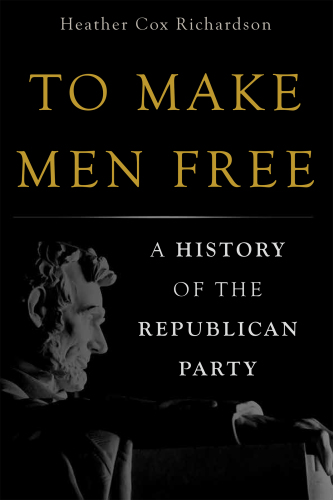
To Make Men Free
A History of the Republican Party
فرمت کتاب
ebook
تاریخ انتشار
2014
نویسنده
Heather Cox Richardsonناشر
Basic Booksشابک
9780465080663
کتاب های مرتبط
- اطلاعات
- نقد و بررسی
- دیدگاه کاربران
نقد و بررسی

August 4, 2014
Under President Lincoln, Congress passed the first income tax, encouraged immigration, and strengthened the Federal government; Theodore Roosevelt urged business regulation; Eisenhower supported government funding of schools, roads, and hospitals. Sadly, writes Richardson, Boston College professor of history (Wounded Knee: Party Politics and the Road to An American Massacre), in this opinionated history, upon these figures’ exit from the scene, their party reversed course to take up its role as the protector of the rich. Lincoln and his Republican contemporaries believed government should promote individual economic advancement, but their successors (well before the Russian revolution) denounced such thinking as “socialism” and “communism.” In the first decade of the 20th century, a new generation of Republican progressives supported TR’s reforms, but by the 1920s their influence was minuscule. Eisenhower’s popularity gave middle-of-the-road modern Republicanism a short-lived cachet, but, Richardson argues, the subsequent half century has seen the party harden into a defender of jingoism, privilege, and property under the banner of Movement Conservatism. The election of Barack Obama, a Democrat, signaled a “return to the vision of Republicans Lincoln, Theodore Roosevelt, and Eisenhower,” just as it “revealed the hollow core of the twenty-first-century Republican Party.” Richardson aptly ends by wondering if the modern Republican Party “will find a way to stay committed to the ideals of its founders.”

August 1, 2014
A new history of the Republican Party as a relentless pull by big-business interests has cast it farther and farther from its noble founding principles. How did the party of Abraham Lincoln-dedicated to checking the spread of Southern "Slave Power" in the West and to expanding the vision of freedom and opportunity among the larger pool of poor and newly emancipated-become the party of the rich and entitled? Richardson (History/Boston Coll.; Wounded Knee: Party Politics and the Road to an American Massacre, 2010, etc.) makes a bold, pertinent argument that the Republican Party has always been beset by contradictions within its core as a result of the founding tension between the belief in equality of opportunity and the protection of property. She focuses on three presidents who have been true to the original Republican cause-Lincoln, Theodore Roosevelt and Dwight Eisenhower-and three periods following progressive legislation eras that saw a reactionary swerve back to pro-business policies and a resulting economic crash: 1893, 1929 and 2008. The party emerged in reaction to the passage of the Kansas-Nebraska Act of 1854, threatening to spread slave power into what Northerners hoped would be a West open to "poor but hardworking, ambitious young men." Harkening back to Thomas Jefferson and the Declaration of Independence, the Republican Party embraced "the first principles of republican government" and broke with "schemes of aristocracy," namely the concentration of wealth among the upper few. Lincoln's assassination, followed by Andrew Johnson's undercutting of Reconstruction, saw the beginning of the reactionary turn back to obstructionism and narrow business interests. Richardson systematically delineates how the "trickle down" economic approach never worked, yet was continually pushed by rogue elements of the party. A hard-hitting study that will surely resonate with ongoing attempts to regenerate the GOP.
COPYRIGHT(2014) Kirkus Reviews, ALL RIGHTS RESERVED.

























دیدگاه کاربران